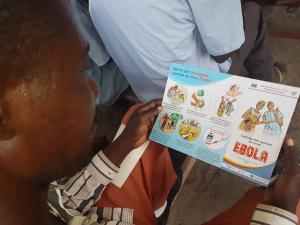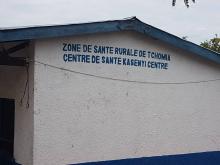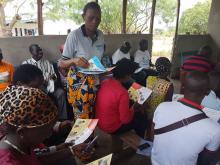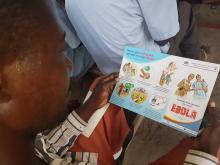WHO scales up new front against Ebola in the Democratic Republic of Congo, near the border with Uganda
BENI, Nord Kivu Province, 25 September 2018 (WHO) – The World Health Organization (WHO) is working in close coordination with the Ministry of Health and with the support of other partners to step up its emergency response in the East of the Democratic Republic of the Congo, with the dispatch of an advance multidisciplinary intervention team from the Beni base to address the current needs in Ituri, North-East Province, where a new confirmed case of the Ebola virus disease (EVD) has been reported in the Tchomia region, located 50 km from Bunia, the provincial headquarters.
Sunday 23 September 2018, a convoy of some 10 four-wheel drive vehicles transporting experts and personal protective equipment, left the town of Beni for Bunia. The experts include epidemiologists, logisticians, risk communicators, social mobilization and community engagement officers, infection prevention and control specialists, data managers, security officers and others.
The new confirmed Ebola case in Tchomia is directly linked to the positive case that was reported in the Ndindi neighbourhood in Beni, which is one of the epicentres of the ongoing outbreak in North Kivu. The response team had encountered resistance from the local population, owing to a misunderstanding that arose from the burial of a confirmed EVD patient who had died in the area.
‘‘The detection of this case close to Lake Albert is a major cause for concern, not only on account of the high risk of spread to neighbouring countries, but also because it is a clear illustration of the complex situation we are facing on the ground, with challenges such as insecurity and the resistance or refusal of some confirmed EVD patients to be treated in the Ebola Treatment Centre," explained Dr Ibrahima Socé-Fall, the WHO Regional Emergency Director based in Brazzaville. "We are doing our level best to step up our efforts towards community engagement, in order to clear any misunderstandings within the population."
Communication experts from the Ministry of Health, WHO and other partners are equally scaling up their activities on the ground with a view to providing all the required information on the appropriate preventive measures to be observed in respect of Ebola. Local community leaders have also been involved in these efforts, with the aim of disseminating key public awareness messages through local community radios.
"Our teams will support the Ministry of Health and the Ituri Provincial Department of Health (DPS) to mount a robust response, with efficient communication to enhance Ebola risk perception and strengthen active contact tracing,’’ affirmed Dr Allarangar Yokouidé, WHO Representative in the DRC.
Indeed, it is considered that the rapid deployment of responders to the affected region in the DRC’s North Kivu could facilitate surveillance. Contact tracing is ongoing in Kasenyi and Tchomia. Meanwhile, the initial at-risk populations have been vaccinated in the area by the vaccination team deployed by the Ministry of Health.
In Ituri, the local health responders with the support of the joint team of experts from the Ministry of Health and WHO that came in from Kinshasa over a week ago, have already “done a great job together in Bunia in terms of preparedness activities for the response to Ebola,” he stated.
The mission from Beni will strengthen prevention and control efforts and fast-track response activities in the lake areas of Tchomia and Kasenye. The province shares a common border with Uganda along Lake Albert, with intensive trading activities between the town of Bunia and the main Ugandan border towns.
Communications Officer
WHO DRC
Tel : +243 81 715 1697
Office : +47 241 39 027
Email: kabambie [at] who.int (kabambie[at]who[dot]int)
Communications Manager
WHO Regional Office for Africa
Email: okas [at] who.int (okas[at]who[dot]int)
Tel: +242 06 508 1009






